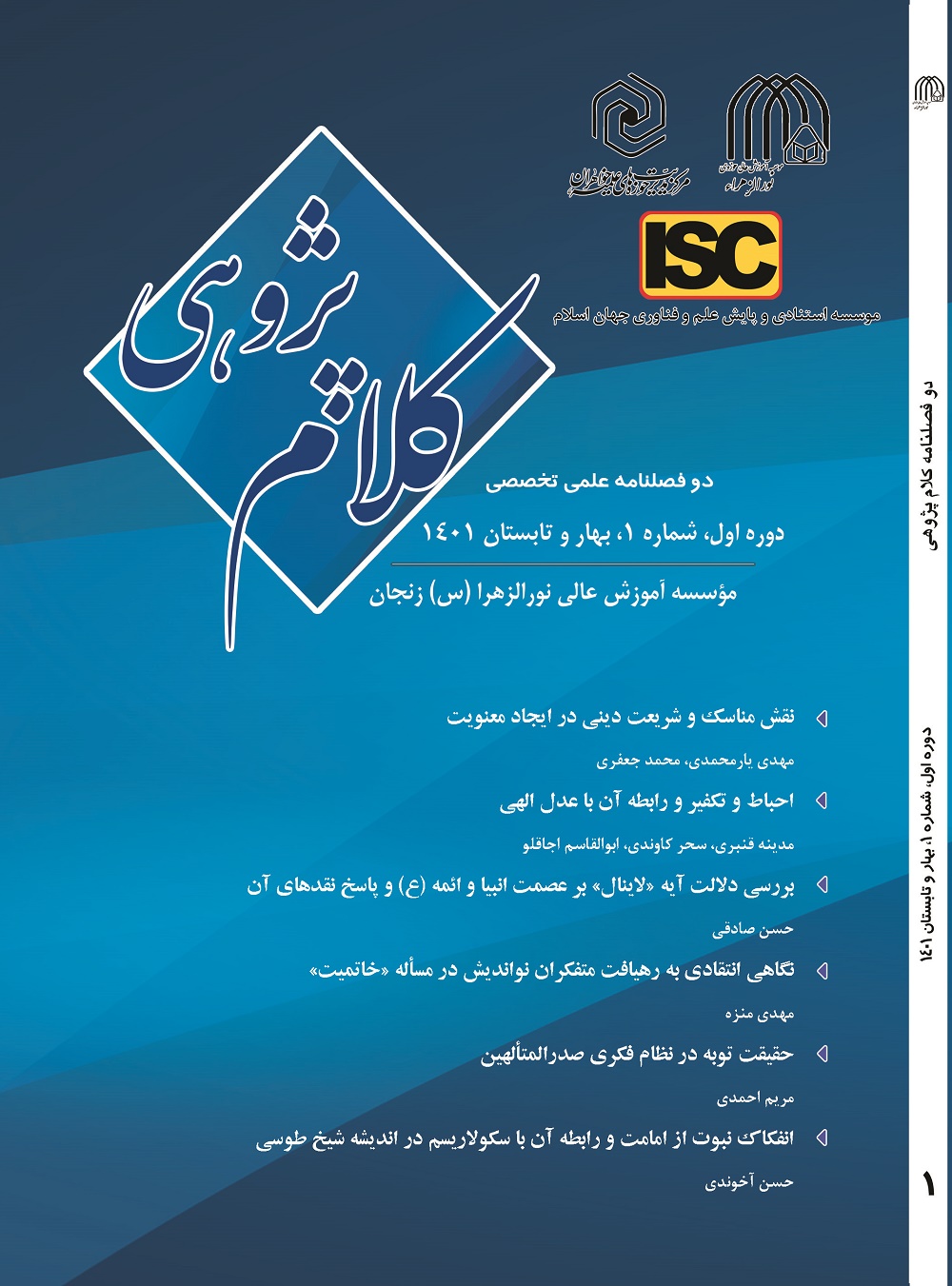نوع مقاله : مقاله پژوهشی
نویسندگان
1 کارشناسی ارشد رشته فلسفه و کلام دانشگاه قم
2 دانشیار فلسفه و کلام اسلامی دانشگاه قم
چکیده
یکی از موضوعاتی که امروزه مورد بحث و بررسی محافل علمی قرار گرفته است، مساله دموکراسی و نظام امامت و رابطه آن دو با همدیگر است. متکلمان و فلاسفه شیعی، امامت را حقی الهی و از اصول دین میدانند، از سوی دیگر، عدهای از دگراندیشان شیعی و اندیشمندان غیرمسلمان با استفاده از مبانی جامعه شناختی خود و عدم تأمل و دقت در آیات و روایات و تطبیق دادن این مقام الهی با مقامات و نظامهای بشری، قائل به ناسازگاری امامت شیعی و دموکراسی غربی شده و معتقدند نظام امامت با اصول دموکراسی و مبانی فکری، سیاسی و معرفت شناختی آن همسان نیست و تعارض دارد. از این رو نگارنده بر آن است که رابطه این دو مقوله را با تکیه بر آراء ژان ژاک روسو و ابن میثم بحرانی بررسی کرده تا نشان دهد که آیا میان این دو نسبتی وجود دارد یا نه؟ لذا برای نیل به این هدف، به تبیین دموکراسی از دیدگاه روسو و نظام امامت از نظر ابن میثم پرداخته و سپس نوع رابطه دموکراسی و امامت را تحریر و تحلیل خواهیم کرد که دموکراسی نه سازگاری مطلق با امامت دارد و نه تعارض مطلق.
کلیدواژهها
عنوان مقاله [English]
Anaylis of Correlation between Western Democracy and Shiite Imamate through the Approach of Jean-Jacques Rousseau and Ibn Maitham
نویسندگان [English]
- sajede alzahra mehri 1
- Marzieh Sadeghi 2
1 Master's degree in Philosophy and Theology, University of Qom
2 Associate Professor of Philosophy and Islamic Theology of Qom University
چکیده [English]
One of the issues debated in scientific circles today is the question of democracy and the Imamate system and their correlation. Shia theologians and philosophers consider Imamate as a divine right and one of the principles of religion. On the other hand, some Shia dissidents and non-Muslim thinkers, applying sociological knowledge, having lack of reflection and precision in the Quranic verses and traditions, and adapting this divine authority with the human authorities and systems, have considered the incompatibility of the Shia Imamate and Western democracy. In fact, they believe that the Imamate system is incompatible and in conflict with the principles of democracy and its intellectual, political and epistemological foundations. Therefore, his study attempts to discuss the correlation between these two categories based on the opinions of "Jean-Jacques Rousseau” and “Ibn Maitham Bahrani" in order to denote whether there is a relationship between these two or not. So, to achieve this aim, democracy is defined through Rousseau's point of view and Imamate system is explained through Ibn Maitham's viewpoint. Then, "the type of correlation between democracy and Imamate" is investigated to represent that democracy is neither absolutely compatible with Imamate nor absolutely contradictory.
کلیدواژهها [English]
- Democracy
- Imamate
- people
- Rousseau
- Ibn Maitham
قرآن کریم
- اربلاستر، آنتونی، 1379ش. دموکراسی. ترجمه: حسن مرتضوی، انتشارت آشیان، تهران، اول.
- آقا بخشی، علی؛ افشاری راد، مینو،1379، فرهنگ علوم سیاسی، نشر چاپار، تهران.
- بحرانی،علی ابن میثم، 1417، النجاة فی القیامة فی تحقیق امر الامامة، مجمعالفکرالاسلامی، قم، دوم.
- ____________، 1420ق ، شرح نهج البلاغه، دارالثقلین، بیروت، بی نو.
- ____________، 1406، قواعد المرام فی علم الکلام، تحقیق: سید احمد حسینی، مکتبه آیت الله مرعشیالنجفی، قم، سوم.
- بشیریه، حسین،1380، درسهای دموکراسی برای همه، مؤسسه پژوهشی نگاه معاصر، تهران، بی نو.
- بیات، عبدالرسول، 1381، فرهنگ معاصر ، موسسه اندیشه و فرهنگ دینی، قم، سوم.
- بیتهام، دیوید؛ بویل، کویل، 1376، دموکراسی چیست؟، ترجمه: شهرام نقش تبریزی ، انتشارات ققنوس، تهران.
- ثقفی، ابواسحاق، بی تا،الغارات، بی جا.
- جونز، ویلیام تامس، 1383، خداوندان اندیشهی سیاسی، ترجمه: علی رامین ، انتشارات علمی و فرهنگی، تهران، اول.
- دشتی، محمد، 1382، ترجمه نهجالبلاغه، مؤسسه تحقیقاتی امیرالمؤمنین، قم، سوم.
- راغباصفهانی، حسینبنمحمد، 1412، مفردات الفاظ القرآن کریم، انتشارات دارالقلم، بیروت، بی نو.
- روسو، ژانژاک،1380، قرارداد اجتماعی، ترجمه: مرتضی کلانتریان، انتشارات آگه، تهران، اول.
- صافی، لطف الله، 1361، پیرامون معرفت امام، نشر آفاق، تهران، اول.
- طاهری، ابوالقاسم، 1393، تاریخ اندیشههای سیاسی در غرب ، انتشارات قومس، تهران، دوم.
- طباطبایی، سیدمحمدحسین، 1380 ش، المیزان فی تفسیر القرآن، انتشارات جامعهمدرسینحوزهعلمیه، قم، بی نو.
- طبرسی، ابی علی الفضل، 1404، جوامع الجامع فی تفسیر القرآن الکریم، مکتبۀ الکعبه، تهران، اول.
- عباسی، حسن، 1383، ساختار منطقی اندیشه سیاسی اسلام، ترجمه: مصطفی فضائلی ، بوستان کتاب، قم.
- عبدالخالق، فرید، 1419، فی الفقه السیاسی الاسلامی ، دارالشروق، قاهره، دوم.
- فیومی، احمدبنمحمد، ۱۴۱۴، مصباح المنیر ، دارالهجره، قم، اول.
- کوهن، کارل،1373، دموکراسی، ترجمه: فریبرز مجیدی، انتشارات خوارزمی، تهران، اول.
- مجلسی، محمد باقر، ۱۴۰۳، بحار الانوار الجامعه لدرر اخبار الائمه الاطهار، دارإحیاء التراث العربی، بیروت، دوم.
- مکارم شیرازی، ناصر1383 ش، تفسیر نمونه ، انتشارات دارالکتاب الاسلامی، تهران، چهل و هفتم.
- میل، جان استوارت، 1975 م ، رساله درباره آزادی، ترجمه: جواد شیخ الاسلامی، بنگاه ترجمه و نشر کتاب، تهران.
- هلد، دیوید، 1378، مدل های دموکراسی، ترجمه: عباس مخبر، روشنگران و مطالعات زنان، تهران.

